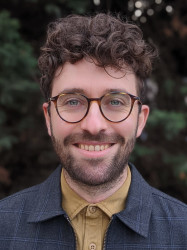Summary
I am a lecturer in the Department of Aeronautics at Imperial College London, where I lead the Computational Astrodynamics (COAST) research group. Prior to joining Imperial, I was a Postdoctoral Associate first at the University of Arizona (Tucson, AZ, USA) and subsequently at the Colorado Center for Astrodynamics Research of the University of Colorado (Boulder, CO, USA). I completed my doctoral studies at the Technical University of Madrid (Spain) in 2017 while working as an Early Stage Researcher in the Stardust Marie Curie Initial Training Network. I obtained a MSc (2013) and BSc (2009) from the University of Naples "Federico II" (Italy), both in Aerospace Engineering.
I specialise in computational astrodynamics, focusing on advanced numerical and data-driven methods to understand and predict trajectories of space objects. My research is applied to large-scale problems in space situational awareness and robust spacecraft guidance, navigation, and control. Ongoing research projects include:
- Highly efficient spectral orbit propagation techniques
- Robust filtering and uncertainty quantification of US Space Catalogue ephemerides
- Estimation of ballistic coefficients of resident space objects through deep learning
- Collision risk assessment for large constellations
- Light curve simulation and inversion through deep learning
- Identification of unknown dynamics for onboard guidance
- Neural policy guidance for Entry, Descent, and Landing.
Potential PhD opportunities
I am always looking for outstanding, highly motivated PhD students for PhDs on advanced topics in astrodynamics. Prospective students are welcome to email me providing:
- Information on a proposed funding source and duration of funding.
- Evidence of a strong background in one or more of the following disciplines: celestial mechanics, dynamic optimisation/state estimation, machine learning (in particular regression problems).
- A technical report, written in English, concerning a project in one of the above disciplines. For example, this can be your Master's dissertation, final year project, conference/journal paper in which you are the lead author.
- Evidence of excellence in an MEng/MSc in Aerospace Engineering or related disciplines.
Due to the large volume of queries, I cannot guarantee a reply if the above information is not provided.
Selected Publications
Journal Articles
Amato D, McMahon JW, 2021, Deep learning method for Martian atmosphere reconstruction, Journal of Aerospace Information Systems, Vol:18, ISSN:2327-3097, Pages:1-1
Amato D, Bombardelli C, Baù G, et al., 2019, Non-averaged regularized formulations as an alternative to semi-analytical orbit propagation methods, Celestial Mechanics and Dynamical Astronomy, Vol:131, ISSN:1572-9478, Pages:21-21
Conference
Chen S, Amato D, Dynamical characterization of endogenous conjunctions within the Starlink constellation, 33rd AAS/AIAA Space Flight Mechanics Meeting
Araya IA, Amato D, 2022, Spectral analysis of US Space Catalog ephemerides for LAGEOS-1, AIAA SCITECH 2022 Forum, American Institute of Aeronautics and Astronautics, Pages:1-11
Amato D, Hume S, Grace B, et al., 2020, Mars EDL and aerocapture guidance under dynamic uncertainty, AAS/AIAA Astrodynamics Specialist Conference

